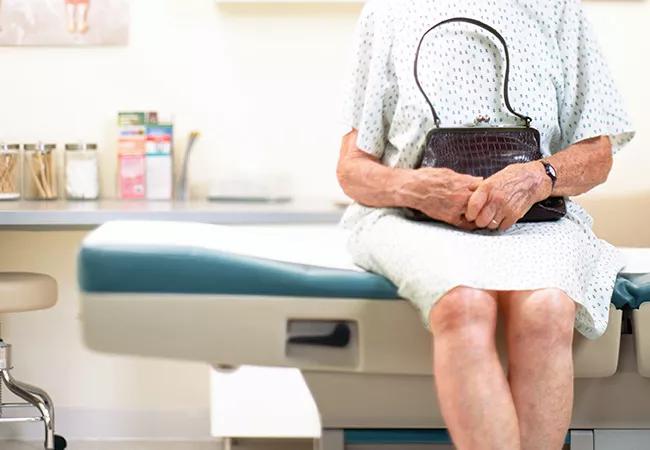Procedure has improved time to discharge for patients

Image content: This image is available to view online.
View image online (https://assets.clevelandclinic.org/transform/99e21b46-efd3-40d6-8d3d-7ec4bce23847/650x450-POP_jpg)
650×450-POP
Patients undergoing robotic assisted pelvic floor reconstruction surgery are typically discharged after a one-night hospital stay. But a study by Cleveland Clinic urologists found that same-day discharge after these procedures was just as safe, with no difference in outcomes or patient satisfaction. The study confirms what Cleveland Clinic physicians have observed in their clinical practice since a same-day discharge protocol was initiated three years ago.
Advertisement
Cleveland Clinic is a non-profit academic medical center. Advertising on our site helps support our mission. We do not endorse non-Cleveland Clinic products or services. Policy
“Prior to this, at the time we were doing this study, there were no other publications that even suggested doing same-day surgery,” says study co-author Howard B. Goldman, MD, Vice Chairman of the Urology Department in Cleveland Clinic’s Glickman Urological and Kidney Institute. “Most people I would speak to about it would say, ‘That’s ridiculous, you can’t send these patients home the same day,’ and in fact we had already started doing just that.”
Robotic assisted surgery has become more common in female pelvic floor reconstruction, and is associated with decreased pain, faster recovery and a shorter hospital stay. “We used to do this robotic surgery as an overnight procedure, and invariably when I made rounds at six o’clock, the patients I’d operated on earlier were sitting up in bed eating Danishes, drinking coffee and reading the paper,” Dr. Goldman says. “I thought, this is something they can be doing at home.” The hospital implemented a same-day discharge protocol for most patients in July 2016. Patients liked the change, and care providers noticed no difference in outcomes. “We’ve never had somebody who came back unexpectedly because they went home too early,” he says.
For the study, Dr. Goldman and his co-authors looked retroactively at the charts of women who underwent robotic assisted pelvic floor reconstruction between October 2015 and October 2016. They compared the results for 10 patients who were discharged the same day with 30 who were kept in the hospital overnight. They also reviewed medical records for any unscheduled Cleveland Clinic emergency room or office visits for 30 days following surgery. Ultimately, patients who were discharged the same day they underwent surgery were no more likely to require an unscheduled emergency room or office visit during this period. The study authors also sent surveys to the patients to ask about their experience. “At the end of the day, the satisfaction was the same,” Dr. Goldman says.
Advertisement
The study was published in June 2018 in the Canadian Journal of Urology. Dr. Goldman says the initial research was intended to show the feasibility of same-day discharge. A follow-up study, recently completed with colleagues in Cleveland Clinic’s Urogynecology Department, is a prospective trial looking at the outcomes of this protocol across a much larger group of patients. Researchers are currently analyzing the results, but “anecdotally, the patients did just fine,” he says.
If healthcare providers do decide to move to a same-day discharge protocol, they will need to do a few things differently, Dr. Goldman says. First and foremost, it’s important to communicate with patients and let them know up front that they’ll be undergoing a same-day surgery. “The number one thing is patient expectations,” he says. When patients know in advance that they’ll be going home, “most of them look forward to that,” he says. Physicians also need to use plenty of local anesthetic at the incision site, and administer non-opiate intravenous pain medications to manage pain.
Ultimately, Dr. Goldman sees many advantages to same-day discharge for these patients. Patients report being happier and more comfortable at home, sleeping in their own beds and eating their own food. They may also have a lower chance of infection, and are more likely to be up and walking around their house, reducing risk of complications like deep vein thrombosis. There’s also the potential for significant savings on healthcare costs, he notes.
Advertisement
“I’m relatively aggressive about getting my patients out of the hospital, because with the appropriate patient and the appropriate surgery, I actually think they do better at home,” he says. “This establishes that it’s safe and practical for patients to go home the same day (with robotic assisted pelvic floor reconstruction).”
Advertisement
Advertisement
Pediatric urologists lead quality improvement initiative, author systemwide guideline
Fixed-dose single-pill combinations and future therapies
Reproductive urologists publish a contemporary review to guide practice
Two recent cases show favorable pain and cosmesis outcomes
Meta-analysis assesses outcomes in adolescent age vs. mid-adulthood
Proteinuria reduction remains the most important treatment target.
IgA nephropathy is a relatively common autoimmune glomerular disease that can be diagnosed only by biopsy
Oncologic and functional outcomes are promising, but selection is key